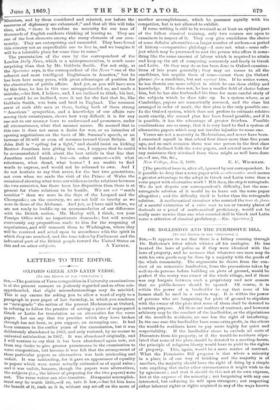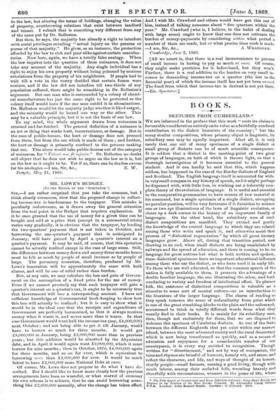DR. ROLLESTON AND THE PERMISSIVE BILL.
(To THE EDITOR OF THE "SPECTATOR:1 Sin,—It appears to ute that there is a fallacy running through Dr. Rolleston's letter which vitiates all his analogies. lie has treated the laws of police as if they were identical with the laws of property, and he 118.9U111C8 that whatever one man may do with his own goods may be done by a majority with the goods of the whole community. The arguments he draws from the conduct of an autocratic landholder, front the precautions taken by well-to-do persons before building on plots of ground, would bo perfect if the vestry was owner of the whole village, and if there was any bargain between such a proprietary and new corners that no public-houses should be opened. Of course, it is within the power of a landholder to say that none of his houses shall be used in a certain way. It is within the power of persons who are bargaining for plots of ground to stipulate with the owner of the plots that none of them shall be devoted to a certain purpose. All these arc matters of contract, and however arbitrary may be the conduct of the landholder, or the stipulations of the would-be residents, no one has the right of interfering. In the one case the landholder loses some extra profit, in the others the would-be residents have to pay more highly for quiet and respectability. If the landholder chose to exclude all sects of Dissenters from his property, or if the would-be residents stipulated that none of the plots should be devoted to a meeting-house, the principle of religious liberty would have to yield to the rights of property. This, again, would be a mere matter of contract. What the Permissive Bill proposes is that where a minority in a place is of one way of thinking and the majority is of another, the majority should have the right of doing by a simple vote anything that under other circumstances it might wish to do by agreement ; and that it should do this not at its own expense, but at the expense of the minority ; not bargaining with any one interested, but enforcing its will upon strangers ; not respecting either inherent rights or rights acquired in any of the ways known
to the law, but altering the terms of holdings, changing the value of property, overthrowing relations that exist between landlord and tenant. I submit that is something very different from any of the cases put by Dr. Rolleston.
But then, he says, the majority has already a right to interfere with social privileges entailing " actual injury on the persons or purses of that majority." He gives, as an instance, the protection afforded by the law to rich and poor alike against certain manufactories. Now here, again, we have a totally false analogy. When the law inquires into the question of these nuisances, it does not take any account of the majority. Any single individual has a right to enjoy his own property without being poisoned by noxious exhalations from the property of his neighbours. If people had to wait till a vote in the vestry decided that certain fumes were noxious, and if the law did not interfere till two-thirds of any population Buffered, there might be something in Dr. Rolleston's argument. But one man who is surrounded by a colony of chemical manufacturers has just the same right to be protected as the colony itself would have if the one man outdid it in abominations. Dr. Rolleston would let the majority judge whether it liked catgut, and the minority would be bound one way or the other. This may be a valuable principle, but it is not the basis of our law.
To my mind, the whole argument drawn from nuisances is strained and far-fetched. The general definition of a nuisance is an act or thing that works hurt, inconvenience, or damage. But in the case of public-houses, the hurt or damage does not proceed from them, but from the use which is made of them ; and further, the hurt or damage is primarily confined to the persons making that use. This alone would take public-houses out of the category of nuisances, for " Volenti non fit injuria." Dr. Rolleston no doubt will object that he does not wish to argue on the law as it is, but on the law as it ought to be. Yet if so, there can be the leas excuse for his analogies.—I am, Sir, &c., E. W. Temple, May 31, 1869.































 Previous page
Previous page